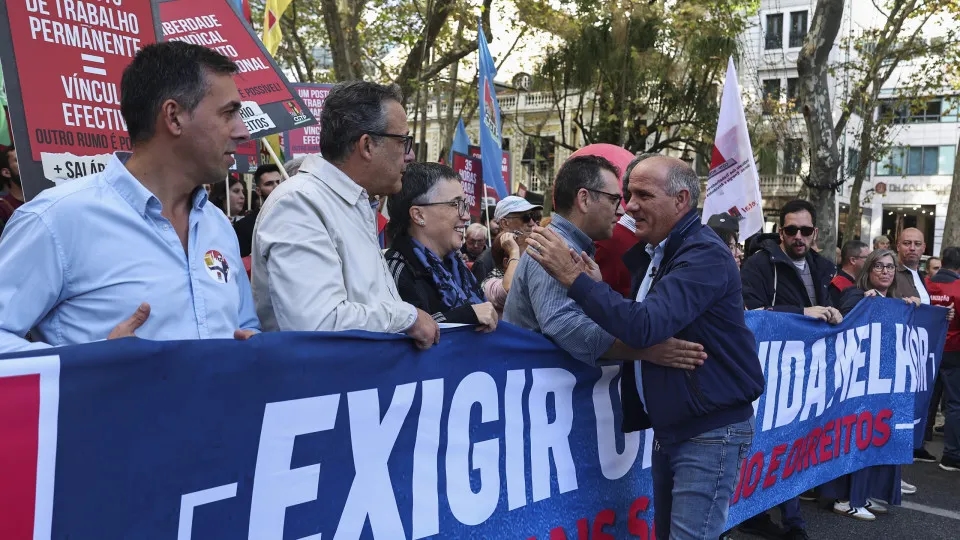The government is "captured by the banks." General strike? "It smells like the Troika."

These positions were taken by the Secretary-General of the PCP, Paulo Raimundo, and the National Coordinator of the BE, Mariana Mortágua, in statements to journalists during the national march called by the CGTP against the labor package of the PSD/CDS-PP government, in Lisbon.
Faced with the statement by the Prime Minister and president of the PSD regarding a possible "capture of the interests of workers and the activities of unions by the interests of political parties that are closely linked to trade union federations," Paulo Raimundo and Mariana Mortágua turned the accusation back on Luís Montenegro, associating the PSD/CDS-PP government with the interests of large economic groups.
"Does he have the nerve to talk about captured unions? This is a government captured by the banks, by the largest companies and economic groups in the country, and which wants to attack those who work, as the right wing systematically does when it comes to power," reacted the national coordinator of the Left Bloc.
According to Mariana Mortágua, the proposed State Budget for 2026, "with a huge handout to the banks, an unprecedented tax cut for banks of hundreds of millions of euros," demonstrates that "the Government is captured by the interests of private entities and large economic groups."
The Secretary-General of the PCP had a similar reaction: "It takes a lot of nerve. A government and a prime minister whose objective is to further increase job insecurity beyond what already exists, and which is already in the thousands."
"We have a government, and in particular four parties, PSD, CDS, Chega and IL, completely captured and in the hands of large economic groups," accused Paulo Raimundo, pointing out: "Look at the State Budget, look at the tax benefits, look at the reduction of taxes on profits, look at all of that."
"Those who are captured by vested interests are the Government and the governing parties," he emphasized.
Regarding the call for a general strike, ten years later, the Secretary-General of the PCP commented: "Times don't repeat themselves, but I would say there are hints of it. It smells of the 'troika', but it's not new. It smells of the 'troika' in the Budget, it smells of the 'troika' in the dismantling of the National Health Service (SNS), it smells of the 'troika' with regard to education and tuition fees, it smells of the 'troika' in labor law, it smells, it smells."
In turn, Mariana Mortágua considered that the PSD/CDS-PP executive headed by Luís Montenegro is, "in many respects, even more ideological than the government during the 'troika' period," when "there was the excuse of having a memorandum."
"Now there is no excuse. This is an ideological government and it has a program for the country: it is a program to liberalize, to privatize, to sell what remains of the public service, to attack labor, to make labor relations more precarious and to reduce wages," he argued.
The Government's draft bill to revise labor legislation, which prompted today's demonstration and the call for a general strike on December 11, includes, among other changes, extending the duration of fixed-term contracts, reinstating individual time banks, ending the ban on external hiring after dismissals, revising parental leave, and strengthening mandatory minimum services in case of a strike.
In Belém, Brazil, the Prime Minister stated that "union representatives must explain" why they are launching a "protest of this magnitude" when discussions are still "underway with social partners," and spoke of a possible "capture of workers' interests and union activity by political parties closely linked to labor union federations."
Read also: Thousands of workers march against the "boss's" labor package.
noticias ao minuto




